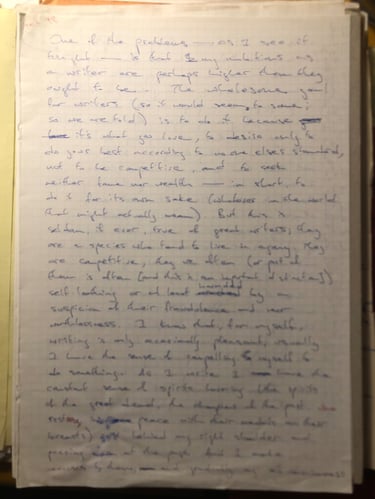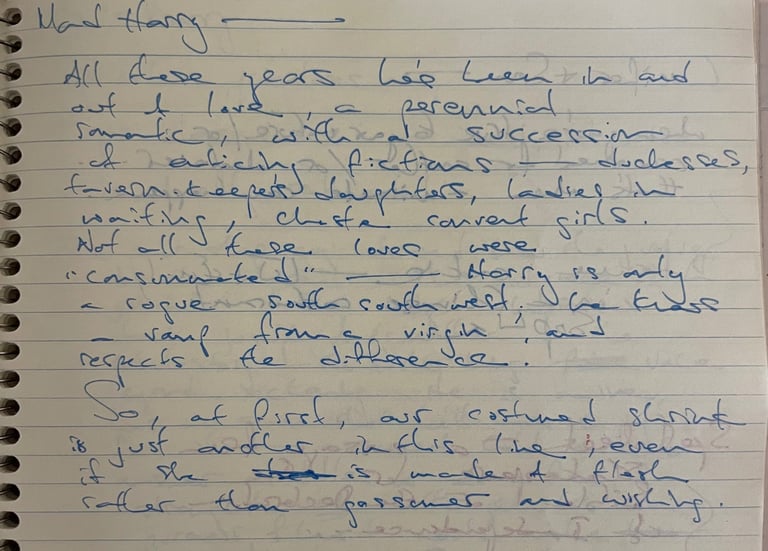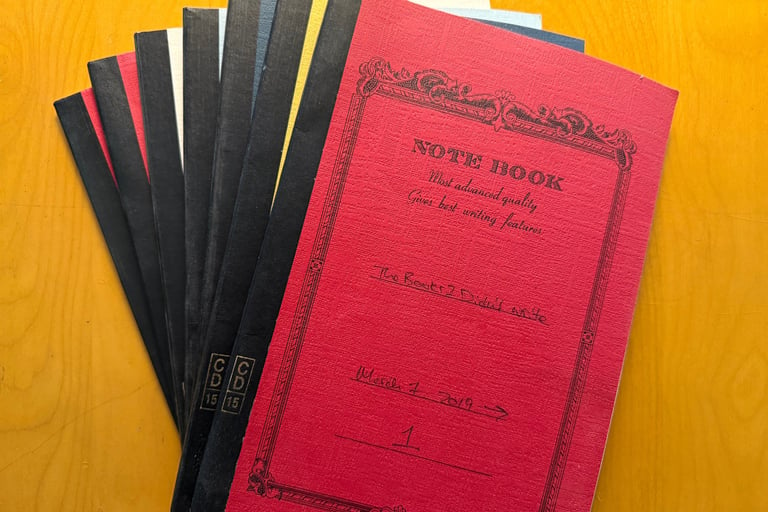Just so much lorem itsum for the nonce...


a bit of characteristic late 20th century sturm und drang
This was going to be a long essay or a short book. I initially came up with the term “Faustian machine” in an effort to describe an essential and inescapable aspect of our culture – namely that we are made to think of ourselves as products, and that we are reared and educated (one might justly say “indoctrinated”) to promote and to sell ourselves. Then over the years it took on a broader, more philosophical significance.
The phrase began to show up in my notes around 2012 or 2013, I think. It referred to our society/culture as a mechanism that turns its inhabitants into Fausts, i.e. people who sacrifice spiritual values for material ones, or who confuse the spiritual with the material. This confusion is, in my own scheme of ideas and values, the essence of the Faustian sin/crime, or at least the Faustian error. (It’s King Lear’s sin/crime too, about which I’ve written elswhere.) I am of course using the word “spiritual” in the broadest sense, and in a non-religious (or not-necessarily-religious) sense. I mean the non-material aspects of life and the human experience of being in the world. I mean the experience of being a soul in a body.
Faust’s error was that he sought fulfillment through exclusively material means – initially through an empirically oriented scholarship, scientific inquiry into the working of the material world, logic-bound philosophy, and, in some accounts, alchemy. And when these disciplines failed to bring fulfillment or contentment, he extended or compounded his initial error by selling his soul in exchange for material boons – money, fame, power, sex… He could only do this because he failed to recognize his soul – i.e. the spiritual dimension of his nature – for what it was, and thus he failed to value it.
Late 20th Century Sturm und Drang
• • •
30 AUGUST 2025


An artifact of partial lunacy
American culture is Faustian because it suffers from Faust’s delusion and thus his despair. America is a Faustian machine because its culture inculcates its inhabitants into this delusional attitude. It is almost literally a mechanism for alienating people from their souls. A normal American, which is to say a person born into the culture, who uncritically absorbs and internalizes all the normal attitudes and values of the predominant culture, can’t help but become a Faust. America tells us that money is the most important, if not the exclusive, standard of value. Wealth is the highest standard of worthiness. Possessions provide happiness and satisfaction. New possessions will provide more happiness and satisfaction than the ones we already own. Consumption fulfills us. Identification with certain brands confers prestige. It goes beyond basic materialism. The material boons of modern life are promoted to us as spiritually beneficial and sustaining. Go read the text on a shampoo bottle – the stuff won’t just clean your hair, it will provide you with an experience of “bliss”. Bliss! [LINK to Adman’s Prayer
To be born into a particular time and place, a particular set of circumstances, a particular culture, a particular family, with their inevitable assortment of values and attitudes, is to be implicated in a destiny you didn’t chose. To achieve any distance, any perspective that might allow you to perceive your native culture as a culture - as a particular assortment of attitudes and values, rather than as reality itself - is rare. The normal thing is to experience life from within the limited and particular perspectives of the culture into which you were tossed by fate, and to absorb these perspectives into an unconscious sense of “the way things are”, i.e. reality. In this sense, we might speak of any cultural system as a machine for creating consciousnesses.
American culture isn’t exceptional in being a machine; it’s exceptional in being a machine that operates to detach people from their instinctual selves and to implant in them a desire to substitute not just material but commercial desiderata for spiritual ones. Or to seek to satisfy spiritual needs with material objects, which is as futile and paradoxical and absurd as seeking to slake a bodily thirst by consuming ideas, or by praying, or by singing a song.
A FAUSTIAN MACHINE?
vox note from March 2015
• • •
30.VII.2025


some of the notebooks in which I wrote about the books I didn't write
• • •
I thought this morning of a news item from last week or the week before. It was a photograph of a long line of climbers waiting to step onto the peak of Chomolungma, the mountain that westerners call Mount Everest. The photograph was captioned with a remark about the high number of deaths on that mountain in recent years. But what I was really thinking of this morning wasn’t the news item itself, but rather the many responses to it on social media, all of which refused - ostentatiously and in most cases sarcastically - to deplore the self-inflicted, or at least self-sought, deaths of a passel of wealthy pseudo-adventurers. The general attitude of these commenters was one of almost-gleeful scorn – schadenfreude shading into todenfreude. How can we be expected to respond in any other way? Our compassion is so constantly taxed these days. Rich white men – men who’ve enjoyed every advantage and every opportunity, many of which have been altogether denied to others, risk their lives in cavalier pursuit of catered adventure and the unearned prestige of having “conquered” the world’s most conspicuous pinnacle when all they did was pay a lot of money to be commended thither by teams of competent experts who take care of everything [every detail] except the business of putting one foot in front of the other and breathing [deeply] (from an oxygen tank).
Nobody asked them to do this. Nobody required it of them. [They did not undertake the expedition in order to benefit anyone other than themselves.] They couldn’t do it unless they had a lot of money and a lot of time to spare – much more than anyone else. And a lot of self-importance/vanity too. The spectacle of a crowd of these vain pseudo-adventurers elbowing each other off the path to the highest point on planet Earth is a metaphor for… for so much.
Why was I thinking of this today? Because here I am, approaching the conclusion of an ambitious, arduous journey. It’s getting very difficult to progress. More strenuous [with every step]. More frequently dispiriting. It’s hard! It’s a hard thing to write a book at all. But this book, which has involved a kind of ruthless investigation/interrogation/review and assessment of my past selves, a steeping in my history of wasted potentials, squandered opportunity, futility and failure. And the bumping up against the taboos and deep forbidden precincts of my own psyche – the hidden forces and mysterious dynamics that have conspired to make me a failure – a failure – in my work, in my attempts to realize myself as a creator, a thinker, an artist. The dark ministers of futility and mortification… Alastor. Nemesis. Erinys. Lyssa. Gorgon. All of these vigorous/vital malefic powers that have hounded and haunted me these fifty years.
But who gets to write a book? Any book? Who has the time? Who has the money? Who has the leisure? [Who has the arrogance to imagine himself capable of such a thing?] Who has the education? Not just now, in the writing, but over the prior decades, in the living, in the gaining experience? Only a privileged person – an enormously, inordinately privileged person – could write a book such as this, whatever its merits. And so, who am I to expect sympathy for my struggles? Any understanding? [Even any acknowledgment/recognition?] I’m a straight white man who grew up wealthy in New York, Paris, and London. Who received a superior education. Who was exposed to the full range of what history and civilization have unfolded. Who had the opportunity and ability to make of himself whatever he may have wanted [and been capable of]. But he was a sad boy to whom a few nasty things happened, so he wasted it all – almost all of it. Fine. He’s trying to own up to it. He’s trying to get past it. To be grateful and hopeful and to make the most of the time he has left. Fair enough. Writing this book is part of that. Fair enough.
But so what? The very struggle he’s undergoing in the writing of this book is an emblem and product of his privilege, of his vast and life-long privilege [of the vast and life-long privilege he enjoys]. I see all this. I hear all this in my mind, almost word for word, when I find myself struggling and feeling depressed with this endeavor [which is to say: every damned day]. This book, whatever it is, is the product of a life of wasted privilege. It may be an [honest, even honorable] attempt to reckon with that waste, and perhaps in some way to redeem it, but it’s still, whatever else it might [turn out to] be, a testament to privilege and complacency and waste – wasted talent, wasted vision, wasted opportunity. So, to make the most of what remains of my talents and to try, at this late date, to scale this mountain of waste is really just another exercise in privilege undertaken for no one’s sake but my own. The struggle, such as it is, is my own, and it’s a peculiar struggle at comes to me entirely through and because of the many privileges I’ve enjoyed up to this day. It’s too late – and [anyway] beside the point – to worry about how others will receive it. I don’t want to belabor the metaphor. [Too late!] I’m approaching the end of a difficult expedition that I’ve chosen to undertake, and which most people would never even have the opportunity to choose [to consider, let alone even begin]. I’m lucky. I should be grateful and make the most of it. As you approach the peak, owing to the efforts, skill, and experience of dozens of sherpas and outfitters and travel agents and physicians, you become aware, perhaps for the first time, of how [utterly] vain is this endeavor, how self-indulgent, how silly in a way. What to do?
Just keep going. Make the most of it. [You’re here.] Be grateful. Be thankful. Be humble. Acknowledge those who’ve helped. Appreciate the opportunity. Be aware. Be present. Feel your every breath [Take a deep breath]. Look up. Behold the view. Look around. Appreciate the view. Take another breath. And keep going. Keep going until you get to the top.
The dumbest, most complacent, most ungrateful, most wasteful thing you can do now is fuck up and die because of some silly mistake or mere failure of heart of will. It’s hard? Good! You’re struggling? Good. Take a breath. Watch where you set your foot. Take another breath. Keep going.